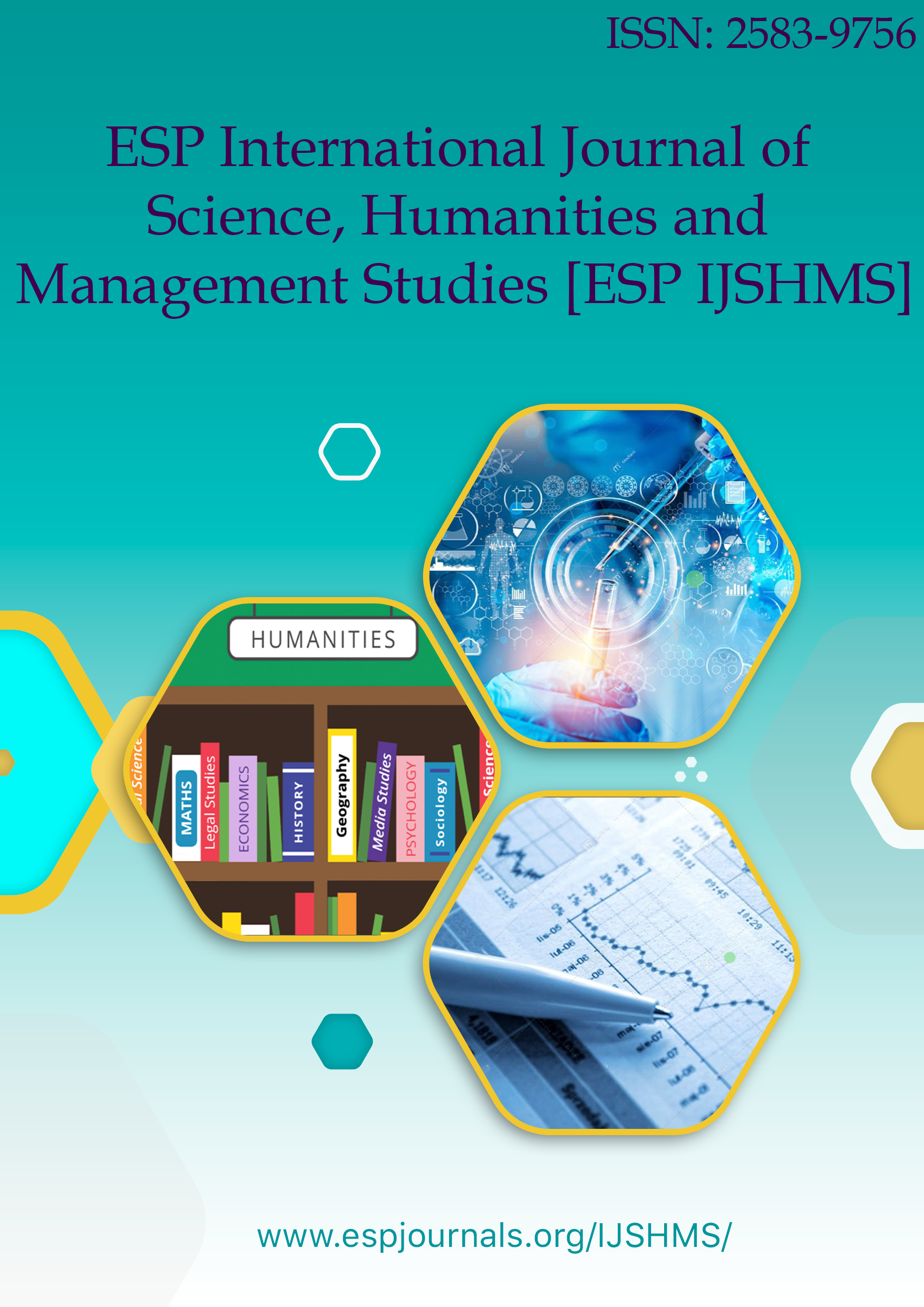ESP International Journal of Science, Humanities & Management Studies(ESP-IJSHMS)
Citation :
Vijay Jaiswal, Saroj, 2024. "Perceptions of CPD for Social Science Teachers in Higher Education" ESP International Journal of Science, Humanities & Management Studies(ESP-IJSHMS) Volume 2, Issue 2: 111-122.
Abstract :
The study attempts to examine the social science teachers’ perception about Continuing Professional Development (CPD). The population of the study was consisted of teachers teaching in the subjects like philosophy, history, economics, psychology, sociology, military sc., anthropology, political science, education and education training (only B.Ed & M.Ed. courses) at higher education level in universities and colleges (including self-financed and aided both) of Meerut and Saharanpur Mandals of U.P. A sample of 539 social science teachers was collected from the population using random sampling techniques. The findings of the study showed that the social science teachers have positive perception about CPD. Further, it was also found that aided college/university social science teachers have the better perception towards CPD in comparison to self-financed college/ private university social science teachers.
References :
[1] Amigot, M. (2017). MOOCs evolve into professional development courses with alternative credentials. IBL studios. Retrieved from https://www.iblstudios.com/2017/07/08/moocs-evolve-professional-development-courses-alternative-credentials/
[2] Burns, Mary et. al. (2016). 7 recommendations to improve teacher professional development in fragile contexts. Retrieved from https://www.globalpartnership.org/blog/7-recommendations-improve-teacher-professional-development-fragile-contexts.
[3] Coffman, K. (2015). The professional development advantages of MOOCs. Delcor. Retrieved from https://www.delcor.com/resources/blog/the-professional-development-advantages-of-moocs
[4] EURYDICE (2019). Continuing Professional Development for Teachers Working in Early Childhood and School Education. Retrieved from https://eacea.ec.europa.eu/national-policies/eurydice/content/continuing-professional-development-teachers-working-early-childhood-and-school-education-89_en
[5] Florentine, S. (2015). 4 ways MOOCs are changing professional development. CIO. Retrieved from https://www.cio.com/article/2986306/it-skills-training/4-ways-moocs-are-changing-professional-development.html
[6] Joshith, V.P. (2016). Open Educational Resources and Massive Open Online Courses as a Model for Professional Development of Teachers. University News, AIU, New Delhi, Vol. 54(34), Aug. 22-28, pp. 22-26. Ibid, p.23.
[7] Kumari, A. (2016). MOOCs – An online platform for teacher professional development. Asian Journal of Multidisciplinary Studies, 4(5), 102–107. Retrieved from http://www.ajms.co.in/sites/ajms2015/index.php/ajms/article/view/1799
[8] Laurillard, D., & Kennedy, E. (2017). Moocs can still bring higher education to those who really need it. Times Higher Education. Retrieved from https://www.timeshighereducation.com/blog/moocs-can-still-bring-higher-education-those-who-really-need-it
[9] Mishra, S. K. (2015). Training of Teachers- Search for Appropriate Instructional Strategy. Journal of Indian Education, New Delhi: NCERT, XXXX(04), Feb., 59-64.
[10] Mishra, Pradeep Kumar (2018). MOOCs for Teacher Professional Development: Reflections, and Suggested Actions. Open Praxis: An International Council for Open and Distance Education, 10(01). Available at: https://openpraxis.org/index.php/OpenPraxis /article/view/780/425
[11] Singh, C. B. P. & Munda, Sidam Singh (2017). Continuing Professional Development of College Teachers: Resolving Conceptual Issues. University News, AIU , New Delhi, Vol. 55(30), pp.24-30.
[12] Sinha, J. B. P (2012). Cultural Roots of Indian Mindset. The Social Engineer, 13(1-2), pp.6-17.
[13] Sinha, J. B. P. and Kanugo, R. N.(1997). Context Sensitivity and Balancing in Organizational Behaviour. International Journal of Psychology, 32, pp. 93-105.
[14] Urrutia, M. L., Fielding S., & White S. (2016). Professional development through MOOCs in higher education institutions: Challenges and opportunities for PhD students working as mentors. Journal of Interactive Media in Education, 1, 1–10. Retrieved from https://www-jime.open.ac.uk/article/10.5334/jime.427/
[15] Yadav, S. K. (2016). Licensing and Certification for Professional Development of Teachers. University News, AIU, New Delhi, Vol. 54(50), Dec. 12-18, pp.14-17.
[16] Rabbani, Attar (2017). Academic Staff Development Institutions: From Bad to Better? University News, AIU, New Delhi, Vol. 55(36), Sept. 04-10, pp. 10-16.
[17] Schleicher, A. (2011). ‘The quality of an education system cannot exceed the quality of its teachers', Journal of Teacher Education, March/April, 62 (2), 202-221. Available at: https://www.pearson.com/uk/educators/primary-educators/making-an-impact/research-summaries/to-teach--to-learn.html
[18] Whitehouse, C. (2011). Effective continuing professional development for teachers. Available at: https://cerp.aqa.org.uk/sites/default/files/pdf_upload/CERP-RP-CW-19052011.pdf
Keywords :
Continuing Professional Development. Social Science Teachers, Higher Education.


 : 10.56472/25849756/IJSHMS-V2I2P113
: 10.56472/25849756/IJSHMS-V2I2P113